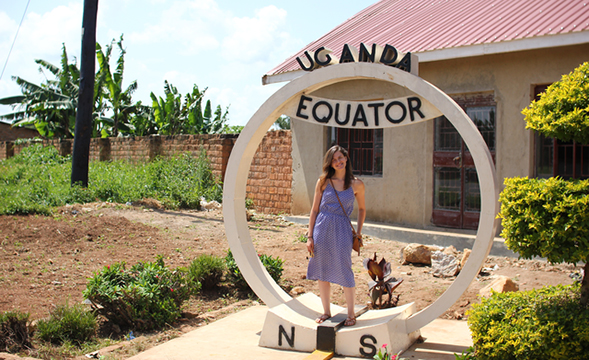A World of Possibilities for SDSU Doctoral Students
Ph.D. numbers increase with 11 new doctoral programs launched in the last decade.

From Southern California to New York City to Kampala, Uganda, Katelyn Sileo’s graduate studies at San Diego State University were a truly international research experience.“SDSU has launched 11 new doctoral programs since 2007, and some older programs have also grown. This growth reflects the campus’s considerable research ambitions and increasing breadth of scholarship.”
In pursuit of her doctoral degree in global public health, Sileo spent a summer working for the United Nations Children's Fund (UNICEF) in New York, analyzing data and writing reports for its Child Health Unit. She also spent nine months living in Uganda, conducting research on engagement with HIV care among men in fishing communities.
These experiences, Sileo says, would not have possible without the connections and resources available in the joint-doctoral program administered by San Diego State University and the University of California, San Diego. Sileo’s UNICEF field placement was arranged by SDSU professor Nancy Binkin, and her research in Uganda was funded by a $20,000 fellowship from the University of California Global Health Institute and National Institutes of Health Fogarty International Center.
“There are so many opportunities out there within SDSU and UC,” she said. “I received research funding and had faculty members on my dissertation committee from both institutions. It expands your network in such a positive way.”
The program Sileo completed is one of 20 joint-doctoral programs at SDSU. The university also offers four professional doctorate programs in audiology, education and physical therapy. The California Master Plan for Higher Education requires the university to partner with other institutions when offering Ph.D.s.
SDSU awarded its first doctoral degree in 1967, and since then has graduated increasing numbers of research professionals.
Last year, 143 students earned doctoral degrees from SDSU, compared to 59 a decade before. This year, 166 doctoral candidates have applied for graduation and/or been cleared to graduate.
“SDSU has launched 11 new doctoral programs since 2007, and some older programs have also grown,” said Edmund Balsdon, associate dean of the Division of Graduate and Research Affairs. “This growth reflects the campus’s considerable research ambitions and increasing breadth of scholarship.”
After Sileo defended her thesis in the fall, she took a postdoctoral fellowship at Yale University, where she is continuing the research she began as a student at SDSU. Her doctoral research examined how social and physical environments affect Ugandan fishermen’s ability to remain engaged in HIV care. Factors like alcohol use, stigma, perceptions of masculinity, and a lack of transportation were among the biggest barriers keeping men from care, Sileo found. For her, the fellowship is a chance to develop more connections in her field and further define her research interests.
SDSU graduate students pursue different paths when they finish their degrees—some go on to work in industry or government, others continue their research in postdoctoral fellowships and some become teachers.
Sileo plans to return to SDSU to participate in commencement and the hooding ceremony, a time-honored tradition that signifies a doctoral candidate has completed her studies and become fully qualified in an academic field.
Her parents, siblings and husband will fly from the East Coast to attend the ceremony, a culmination of an intensive, years-long academic journey that began when Sileo entered SDSU’s Graduate School of Public Health in 2014.
“The faculty’s expertise and the program’s coursework have a global focus. There are so many people doing international work,” Sileo said. “Faculty are really engaged with students. My mentors were supportive of my pursuit of funding opportunities and encouraged me to develop an ambitious dissertation.”
Though Sileo is now at Yale, she continues to collaborate with her mentors at SDSU. For example, she and SDSU public health professor Susan Kiene are collaborating on a funding proposal to develop and test an intervention to address cultural barriers to contraceptive use in rural Uganda.
Kiene was Sileo’s mentor throughout her graduate studies and will hood Sileo during the commencement ceremony. She praised Sileo for her dedication to research and her accomplishments collecting original data in Uganda.
“Even from early on in the joint-doctoral program, Katelyn displayed a great deal of professional maturity and approached her research as a challenge she enjoyed facing,” Kiene said. “I suppose it is every professor's great joy to see their students transition from student to colleague, but for me it is a special joy to see her accomplishing all of these great things and to think this is only the beginning for her.”



